Nation sees tectonic shifts in politics
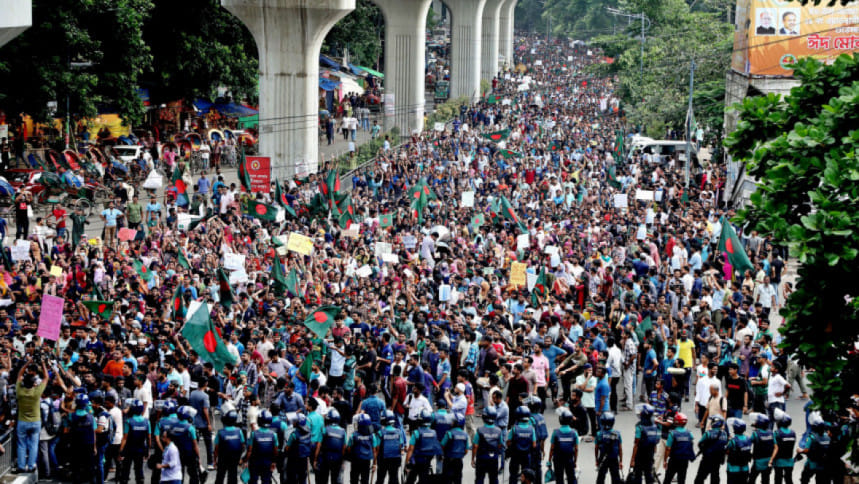
Seismic. That is perhaps the one word close enough to describe Bangladesh's transformation in 2024. The year will remain etched in the nation's annals as a watershed. A deeply entrenched despotic regime had crumbled in the face of a mass uprising that traces its roots back to a fledgling student campaign against government job reservations. With an interim government in charge until the next elections, the nation feverishly awaits a raft of reforms that will finally usher in the much-vaunted Bangladesh 2.0.
The year had begun with the national elections -- which even hardcore Awami League enthusiasts would agree -- had become meaningless after the heavily one-sided and rigged editions of 2014 and 2018. Designated opposition parties and independents were blatantly keen to have the blessings of the ruling Awami League before taking the field. There was little doubt that without the ruling party's endorsement, no one would win the elections. Bangladesh had become a de facto single-party state. Political diversity and opposition existed only on paper. It was no surprise that the 2024 election appeared to have further cemented the Awami League's grip on power.
The student protests began like faint trickles leaking through a sturdy dam that held for years. There was no indication of a strong current on the other side. What began in July as a few hundred students protesting against government job quotas on a handful of university campuses, expected to fizzle out within a few weeks, if not days, turned into a deluge that would sweep away the dam. The peaceful protests quickly gathered momentum to morph into a nationwide movement that forced Sheikh Hasina to flee Bangladesh on August 5 and seek refuge in India, where she has been staying until now.
The interim government, headed by Nobel Peace Prize winner Professor Muhammad Yunus, has been at the helm since the transition and focused on reforming democratic institutions that had been systematically destroyed by the Awami League's self-seeking interests throughout the 15 years it had been in power. On top of that, the incumbent was saddled with a crumbling economy, spiralling inflation, high unemployment and widespread corruption at every pore of public administration and the police, which were in fact the main factors behind strong public discontent.
The initial task, therefore, for the non-partisan interim government, was to stabilise the economy, restore law and order and help build back public confidence in government institutions -- each task more challenging than the next. In addition, there were a string of protests across the country from almost every section of the people who felt wronged during the last 15 years and, although short-lived, intense floods along the eastern flank of Bangladesh.
A month into office, the interim government established six reform commissions -- covering elections, constitution, judiciary, anti-corruption, police and administration -- which are expected to submit reports in January. Their recommendations, some of which have already been reported, are meant to become the initial building blocks of a truly democratic dispensation of this republic.
These recommendations will then be discussed among political parties striving to strike a national consensus. In fact, in a recent development, the chief adviser has said he would be heading a national consensus commission that will presumably hold discussions with all the political parties, leading to a concrete timeline for polls.
This idea of elections after reforms has already divided the political establishment into two streams. One prioritises reforms over elections. A student-led party, which is still in the making, will presumably champion the idea of cementing the reforms before even thinking about elections. The student representatives in government and other student leaders of the July uprising have indicated as much.
The other stream wants elections quickly after only the reforms necessary for the polls. Led by the BNP, the main political rival of the AL regime, this stream is of the opinion that reforms are an ongoing process, not a one-off event, and reforms can truly be implemented only by political parties with the people's mandate.
The discord between the streams is becoming starker with time. Barely a couple of weeks ago, BNP acting chairman Tarique Rahman emphasised the need for quick and decisive action so far as reforms were concerned. He stressed that the people had a right to know the interim government's intentions about the timeline of these reforms. His remarks betrayed a growing impatience after the chief adviser indicated that the elections could be held by late 2025 after minimal reforms, but might take a little longer and be scheduled by mid-2026 if desired reforms were carried out. The BNP has called for further clarity on the election schedule and a concrete roadmap.
Of the two most significant reform commissions, one has been tasked with making recommendations for the elections, including the next one, to be free and fair. The other one is going to suggest major constitutional changes like limiting the prime minister's terms, bicameral parliament and a bar on prime ministers from heading their party.
Political analysts have pointed out that a timeline for implementing the reforms is critical. They argue that if key reforms, particularly those related to elections and the constitution, are not finalised before the elections, the political situation may remain unstable, and the promised reforms might never be fully realised. They warn that without clear progress on these fronts before elections, lasting and meaningful changes would remain difficult to achieve. At the same time, the endorsement of the political parties is also essential for these reforms to take root in essence.
Eminent political analyst Al Masud Hasanuzzaman told The Daily Star that there was no doubt about the necessity of a political consensus for meaningful reforms. "Without it, the process will likely be futile." Stressing consensus, he said, "In the absence of unity, the political landscape may face significant fractures in the coming days."
He indicated that given Bangladesh was sailing into uncharted waters, there was bound to be some "trial and error" in the process before finding the right course. He explained this complex and challenging situation necessitated a political compact for proper planning and implementation of these reforms.
Due largely to the significant transitions of 2024, which earned it the Economist's Country of the Year crown, Bangladesh's future is as fraught with challenges as it is filled with possibilities.


 For all latest news, follow The Daily Star's Google News channel.
For all latest news, follow The Daily Star's Google News channel. 
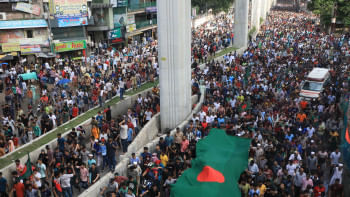
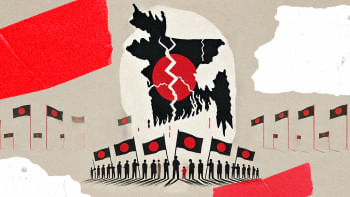



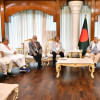


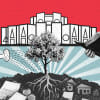


Comments